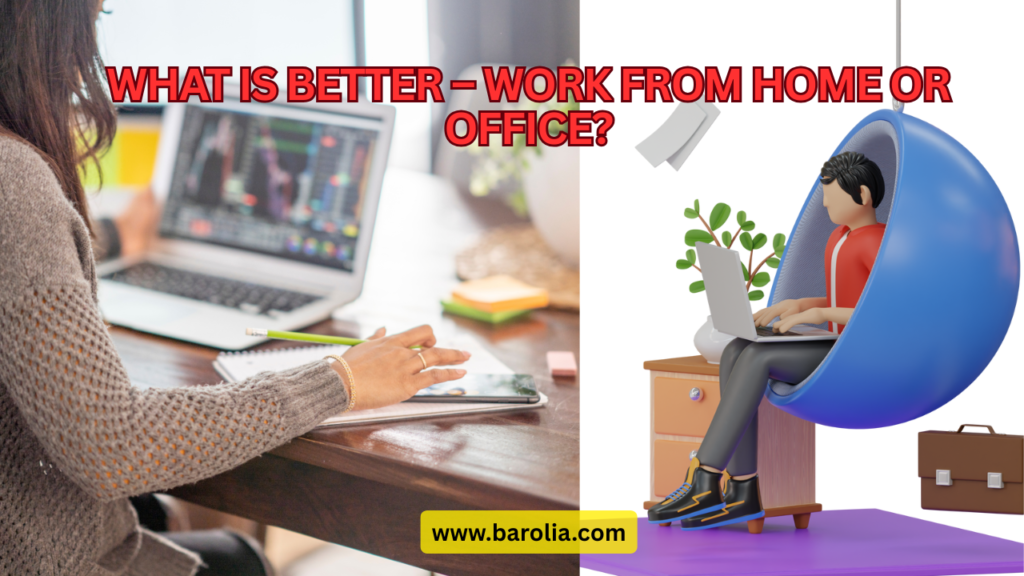Over the last few years, the way people work has changed a lot. Before, most people used to go to the office every day, work from their desks, and return home in the evening. But now, many people are working from home. Some people love working from home, while others still prefer working in an office. This has started a big discussion: Which is better – work from home or office? And how has this change affected the business world?
In this article, we will explore the benefits and problems of both work styles. We will also see how these changes have shaped today’s business culture.
What is Work from Home?
Work from home (also called remote work) means doing your job from your house or any place other than your office. You can use a laptop, phone, or internet to connect with your team or boss. Many jobs today, like those in IT, marketing, writing, designing, and customer service, can be done from home.
What is Working from Office?
Working from the office means going to a physical workplace. You have a desk, a manager nearby, and a team working together in one place. It is the traditional way of working that has existed for a long time.
Benefits of Work from Home
1. No Traveling
One of the best parts of working from home is that you don’t have to travel. You save time and money on transport. It also means less traffic on the road and less stress in the morning.
2. More Flexibility
People working from home can manage their time better. They can choose when to start and finish work (if the job allows it). This is good for people with children or other responsibilities.
3. Better Work-Life Balance
Since you are at home, you can take care of personal tasks during short breaks. You can spend more time with your family, cook your food, or rest if needed.
4. Saves Money
You save money on fuel, food, and office clothes. Companies also save money because they don’t need to pay for large office spaces.
5. Work from Anywhere
You can work from your home, a café, or even from another city or country. All you need is the internet.
Problems with Work from Home
1. Feeling Lonely
When you work from home every day, you might miss your friends and team. This can make you feel alone or less motivated.
2. Distractions at Home
It’s easy to get distracted by TV, family, or other things at home. Some people find it hard to focus without a proper office setup.
3. Less Communication
Talking to your boss or teammates over video calls is not the same as speaking in person. Misunderstandings can happen.
4. No Clear Working Hours
Some people end up working more hours at home. They don’t know when to stop, which affects their health.
5. Not Suitable for Every Job
Jobs like factory work, retail, and healthcare cannot be done from home. So, work from home is not for everyone.
Benefits of Working from Office
1. Teamwork and Communication
Working from the office helps with teamwork. It’s easier to ask questions, share ideas, or solve problems when everyone is in the same place.
2. Professional Environment
An office has fewer distractions. It gives you a space to focus and work seriously.
3. Social Interaction
Talking to co-workers, having tea breaks, and celebrating events together builds strong relationships. This keeps people happy and connected.
4. Easy Management
Managers can directly watch the work and give feedback. It helps in fast decision-making and better control over projects.
5. Better Learning
New employees can learn faster in the office by watching others and getting help quickly.
Problems with Working from Office
1. Long Travel Time
Many people spend hours traveling to the office. This leads to tiredness and wastes time.
2. Less Flexibility
You must follow fixed office hours, even if you are done with your work. This can reduce productivity.
3. Costly for Companies
Companies have to spend on rent, electricity, furniture, and maintenance of office buildings.
4. Stressful Environment
Some offices have pressure, noise, or tight deadlines, which can affect mental health.
Hybrid Model: A Mix of Both
Many companies are now choosing a middle path called the Hybrid Work Model. In this model, employees can work from home for a few days and come to the office on other days. This way, people get the benefits of both systems.
Benefits of Hybrid Work:
- Saves travel time on some days
- Keeps social and professional interaction alive
- Gives better work-life balance
- Reduces office costs for companies
How Today’s Business Culture Has Changed
The shift from office to home has changed the business world in many ways. Let’s look at how.
1. Technology is the New Office
Now, most meetings happen over Zoom, Google Meet, or Microsoft Teams. People use tools like Slack, Trello, and emails to work together. Without technology, remote work would not be possible.
2. Focus on Results, Not Time
Earlier, many companies cared about how many hours you worked. Now, they care more about the results and tasks completed, not the time spent.
3. Better Work-Life Balance
Companies now understand that happy employees work better. So, many are giving flexible hours, mental health support, and wellness programs.
4. Global Hiring
Businesses can now hire people from any city or country. This gives them more talent options and helps people get jobs beyond their local area.
5. Smaller Offices or No Offices
Some startups and small businesses have given up offices completely. They work fully remote and save money, using it for growth or employee benefits.
Final Thoughts: What is Better?
There is no one right answer. Both work from home and office have their pros and cons. It depends on the type of job, the company’s needs, and the employee’s comfort.
- Work from home is great for people who want flexibility, less travel, and a better personal life.
- Office work is better for jobs that need teamwork, direct communication, and fast learning.
The best choice may be a mix of both – the hybrid model – which balances productivity with flexibility.
Conclusion
The way we work is changing fast. Work from home has shown us new ways to be productive, while the office still gives structure and connection. Businesses are adapting by using more technology, changing old rules, and giving employees more freedom. In the end, whether at home or in the office, the goal is the same: to work well, grow together, and stay happy in the process.




